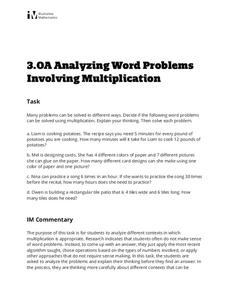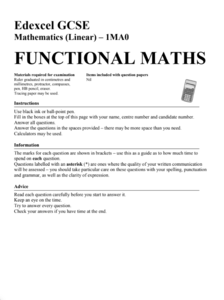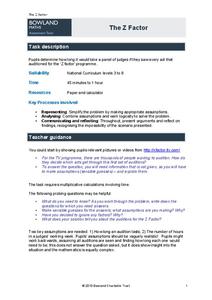Curated OER
Analyzing Word Problems Involving Multiplication
Learners sometimes have difficulty making sense of a word problem. In a guided learning activity, pupils are asked to think about how to find an answer and explain their thinking, rather than finding the answer. It allows them to...
EngageNY
Exploiting the Connection to Trigonometry 2
The class checks to see if the formula for finding powers of a complex number works to find the roots too. Pupils review the previous day's work and graph on the polar grid. The discussion leads the class to think about...
Illustrative Mathematics
How Many Marbles?
Don't lose your marbles! This simple story problem helps make teaching division with fractions much easier. Work on this problem along with the lesson titled, How Many Servings of Oatmeal? to highlight the difference between...
EngageNY
End of Unit 2 Assessment, Part 2: Revise Essay Drafts
Positive feedback is a great way to improve writers' skills. Scholars receive their draft essays back with teacher comments and start the revision process. Next, they prepare to begin their final drafts at home.
Illustrative Mathematics
The Locker Game
Here is a learning activity that incorporates a classic puzzle in mathematics. Young mathematicians are guided through a series of statements that describe rounds of pupils opening and closing lockers. The first person opens all 20...
California Education Partners
Theater Field Trip
Here's an assessment task that's better than watching a show. Young mathematicians solve word problems involving multiplication and division with equal groups. They must find the total number of attendees on a trip to a theater based on...
California Education Partners
Vincent Van Gogh
Living in someone's shadow would be difficult for anyone, including one of the most talented artists of the modern age. Middle schoolers read an excerpt from Vincent Van Gogh: Portrait of an Artist by Jan Greenberg and Sandra Jordan...
Curated OER
The Class Trip
Mrs. Moore's class is trying to earn money for a trip to the science museum, but how much more do they need? Solve this problem with your own class as they develop their ability to model real-life situations algebraically. As an added...
Lakeshore Learning
Grade 3 Test-Taking Strategies and Tips
Promote the most positive reading test-taking strategies to your third graders. A six-question practice test suggests using context clues, underlining words, rereading, and using process of elimination to choose the best answer when...
EngageNY
Read Expressions in Which Letters Stand for Numbers II
Reading and writing take on a whole different meaning in math class. Young mathematicians learn to read verbal phrases by focusing on operation words. They write equivalent algebraic expressions for both mathematical and contextual...
EngageNY
Finding a Rate by Dividing Two Quantities
Develop the right station to solve rate word problems. The 18th instructional activity in a series of 29 starts by interpreting the aspects of rates with two different quantities. Pupils use the interpretation of rates to solve problems,...
Mathed Up!
Functional Maths Questions
Dang, it's a word problem! Pupils address a variety of word problems that involve knowledge of proportions and geometric topics. The General Certificate of Secondary Education review problems require determining costs based on area...
EngageNY
End-of-Module Assessment Task - Algebra 2 (Module 1)
A series of assessment tasks require learners to process information and communicate solutions. Topics include graphing parabolas, solving linear-quadratic systems, factoring polynomials, and solving polynomial equations.
EngageNY
An Appearance of Complex Numbers 1
Complex solutions are not always simple to find. In the fourth lesson of the unit, the class extends their understanding of complex numbers in order to solve and check the solutions to a rational equation presented in the first lesson....
EngageNY
Putting the Law of Cosines and the Law of Sines to Use
Use the Law of Cosines and the Law of Sines to solve problems using the sums of vectors. Pupils work on several different types of real-world problems that can be modeled using triangles with three known measurements. In the process,...
EngageNY
Conducting a Simulation to Estimate the Probability of an Event
How can you complete a simulation when it is not practical to determine the probability of an event? Class members learn that in some situations, it is not feasible to find the probability of an event, but they can estimate it by running...
Concord Consortium
Systematic Solution II
Up the difficulty level by solving a system of equations with variable coefficients. Young scholars devise a plan to solve for x and y in terms of a and b. They represent their solutions as expressions and explain their...
EngageNY
Mid-Module 3 Assessment Task
Time to take a pulse check. The mid-module assessment allows pupils to check where their knowledge falls for the first portion of the module. The 10th resource in a series of 23 covers content from the binomial theorem to hyperbolas....
Mathematics Assessment Project
Middle School Mathematics Test 3
Real-life mathematics is not as simple as repeating a set of steps; pupils must mentally go through a process to come to their conclusions. Teach learners to read, analyze, and create a plan for solving a problem situation. The...
Curated OER
Gifts from Grandma, Variation 1
Composed of three word problems, this math activity exposes young mathematicians to relationships present in multiplication and division. The first problem is most useful with a tape diagram in which learners are working with equal-sized...
EngageNY
Mid-Module Assessment Task: Grade 7 Mathematics Module 3
Lesson 16 in the series of 28 is a mid-module assessment. Learners simplify expressions, write and solve equations, and write and solve inequalities. Most questions begin as word problems adding a critical thinking component to the...
Illustrative Mathematics
Building a General Quadratic Function
Rewrite a quadratic function to easily see the transformations involved. The instructional task takes a general quadratic function and rewrites it into a form that shows the translations and scaling of the parent quadratic function. The...
Bowland
The Z Factor
Young mathematicians determine the number of hours it would take judges of the "Z Factor" television talent show to watch every act. Participants make estimates and assumptions to solve the problem.
EngageNY
Part of a Whole as a Percent
Pupils use visual models, numeric methods, and equations to solve percent problems. To complete the second installment of 20, they find the part given the percent and the whole, find the percent given the part and the whole, and find the...
Other popular searches
- Word Processing Skills
- Word Processing Activities
- Advanced Word Processing
- Basic Word Processing
- Word Processing Project
- Word Processing and Bullets
- Word Processing Lessons
- 1st Grade Word Processing
- Word Processing Documents
- Computer. Word Processing
- Addresses Word Processing
- Computer Word Processing























